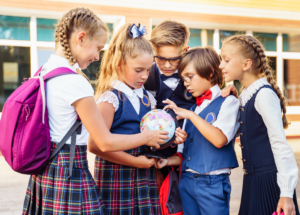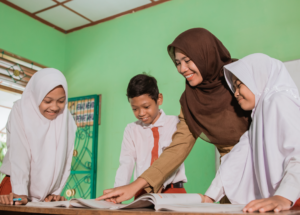5 Ways to Foster Global Citizenship in Your Classroom
In today’s interconnected world, fostering global citizenship in the classroom is more important than ever. Encouraging students to see themselves as part of a global community helps build empathy, cultural understanding, and a sense of responsibility towards the world. Here are five effective ways to nurture global citizenship in your classroom.
1. Integrate Global Topics into the Curriculum

One of the most effective ways to foster global citizenship is by incorporating global topics into your curriculum. This can include lessons on different cultures, global issues such as climate change, poverty, and human rights, as well as current events. For example, you could organise a unit on world cultures, exploring the traditions, languages, and histories of various countries. This helps students understand the diversity of the world and appreciate perspectives different from their own. Using resources like documentaries, international news articles, and stories from different cultures can bring these topics to life.
2. Encourage Critical Thinking and Open Discussions
Promote an environment where students feel comfortable discussing global issues and expressing their views. Encourage them to think critically about world events, media coverage, and cultural narratives. Through open discussions and debates, students can learn to articulate their thoughts, listen to others, and challenge their own viewpoints. Critical thinking exercises, such as analysing global news stories from multiple perspectives, can help students understand the complexities of global issues and the importance of considering diverse viewpoints.
3. Use Project-Based Learning with a Global Focus
Project-based learning (PBL) is a powerful tool to engage students in real-world global issues. Design projects that encourage students to research, analyse, and propose solutions to global challenges. For instance, students can work on a project related to sustainability, where they explore environmental issues in different countries and develop a plan for a more sustainable future. This hands-on approach not only deepens their understanding of global problems but also empowers them to become active participants in creating positive change.
4. Foster Cross-Cultural Connections
 Building connections with students and communities from other cultures can significantly enhance global citizenship. Arrange virtual exchanges or pen pal programmes with schools in other countries. These interactions provide students with first-hand experiences of different cultures, allowing them to develop empathy and a broader worldview. Additionally, inviting guest speakers from various cultural backgrounds to share their experiences and insights can give students a more personal understanding of global diversity.
Building connections with students and communities from other cultures can significantly enhance global citizenship. Arrange virtual exchanges or pen pal programmes with schools in other countries. These interactions provide students with first-hand experiences of different cultures, allowing them to develop empathy and a broader worldview. Additionally, inviting guest speakers from various cultural backgrounds to share their experiences and insights can give students a more personal understanding of global diversity.
5. Model Global Citizenship Through Classroom Activities
Teachers can model global citizenship by integrating activities that encourage empathy, cooperation, and respect. Activities like organising a cultural day, where students learn about and celebrate different cultures, can be a fun and educational way to highlight global diversity. You can also involve students in global service projects, such as fundraising for international causes or supporting local initiatives with a global impact. These activities help students see the tangible effects of their actions and understand their role as global citizens.
Conclusion
Fostering global citizenship in the classroom equips students with the knowledge, skills, and attitudes needed to navigate and contribute to our increasingly interconnected world. By integrating global topics into the curriculum, encouraging critical thinking, utilising project-based learning, fostering cross-cultural connections, and modelling global citizenship through activities, educators can help students develop a sense of responsibility and empathy towards others. In doing so, we prepare the next generation to be informed, compassionate, and active participants in the global community.




